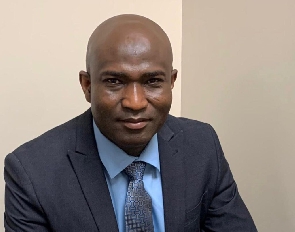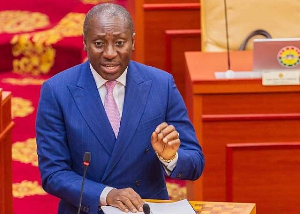A US-based Ghanaian economist, Dr. Sa-ad Iddrisu, has cautioned the government of Ghana on the potential consequences of forcing its proposed debt restructuring exercises on Ghanaians.
According to Dr Iddrisu, if the government fails to engage stakeholders to get their support in the debt restructuring programme, implementing it might lead to the government incurring some judgment debts as well as the collapse of some financial institutions.
Dr. Iddrisu, who made this assertion in an interview on Adom TV, which was monitored by GhanaWeb, added that the government must tread cautiously because its attempts to resolve the country’s debt crisis might land Ghana into an even greater disaster.
“If the government fails to engage in broader consultations and get all domestic bond holders willingly involved without any coercion, then Ghana could be facing a looming judgment debt situation. Secondly, if gov’t is not cautious enough with its debt restructuring program, a bank run could be triggered in the coming months.
“Banks may start facing liquidity challenges and a loss of revenue as the majority of Ghanaian banks purchase government securities and depend on interest payments from the government. Some banks may completely run out of business, and the possibility of unemployment is increasing,” he said.
The economist also urged the government to embark on expenditure cuts and fiscal discipline, as debt restructuring may not be the sole solution to Ghana’s debt problems.
“If government is rigid on its decision to give haircuts to local investors, then she should give herself a haircut too, through cutting back on expenditures such as the office of the President. Presidential staffers at the Office of the President amount to 995. Factor in all their salaries, allowances, and transportation costs (V8s), and imagine the heavy bill on the government. Cut the 995 to 100 – 250 presidential staffers. Cut back on the presidential luxury jet rentals. Cut back on ex-gratia payments to Council of State and others and cut back on per-diems at ministries, agencies, and departments," he said.
“Jamaica Debt Exchange in 2010. However, in 2013, Jamaica needed a second debt exchange and turned to the IMF again. Meaning, it's not about Debt Restructuring. It boils down to the fiscal discipline of government,” Dr. Iddrisu reiterated.
The Minister of Finance, Ken Ofori-Atta, announced a number of measures under the government's Domestic Debt Exchange (DDE) programme.
He stated in a 4-minute address on Sunday, December 4, that the announcement was in line with the government's Debt Sustainability Analysis as contained in the 2023 budget he presented to Parliament on November 24.
The minister laid out, among other things, the exchange of existing domestic bonds with four new ones, as well as their maturity dates and terms of coupon payments.
He also addressed the overarching goal of the government relative to its engagements with the International Monetary Fund as well as measures to minimize the impact of domestic bond exchange on different stakeholders.
"The Government of Ghana has been working hard to minimize the impact of the domestic debt exchange on investors holding government bonds, particularly small investors, individuals, and other vulnerable groups," he said, before outlining three main measures:
• Treasury Bills are completely exempted and all holders will be paid the full value of their investments on maturity.
• There will be NO haircut on the principal of bonds.
• Individual holders of bonds will not be affected.
Watch the second part of Elvis Afriyie Ankrah's interview on GhanaWeb TV below:
Also watch the nomination for the GhanaWeb Excellence Awards Youth Edition below:
IB/BOG
General News of Saturday, 10 December 2022
Source: www.ghanaweb.com
Debt restructuring: Not consulting stakeholders can lead to the collapse of banks - US-based economist warns
Entertainment












